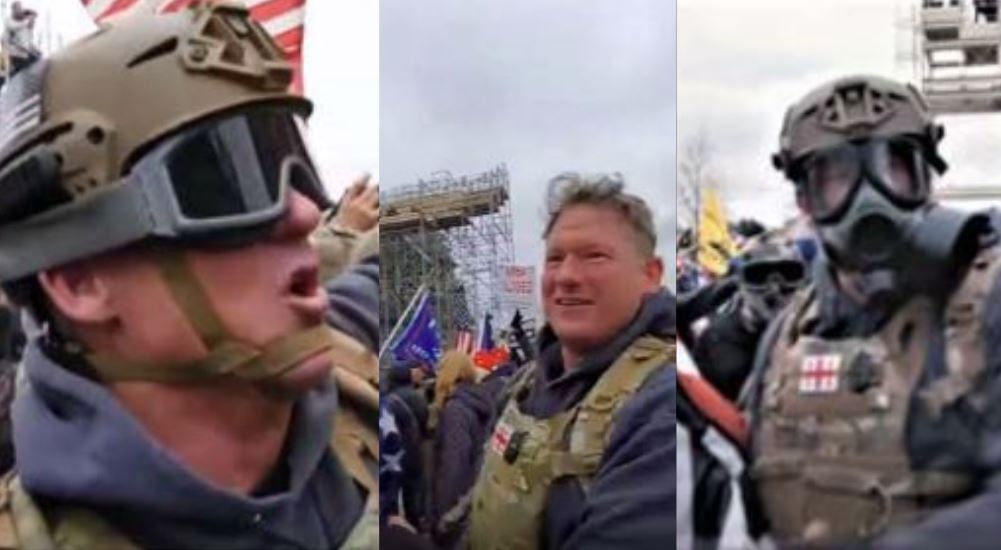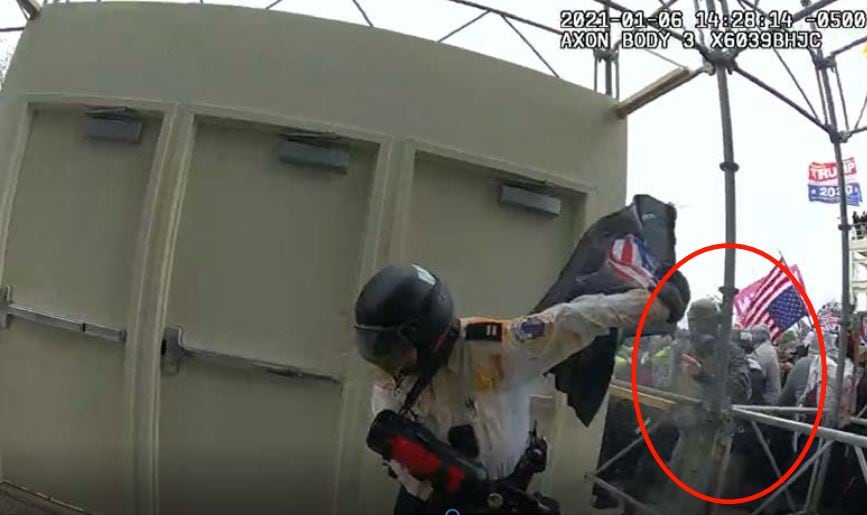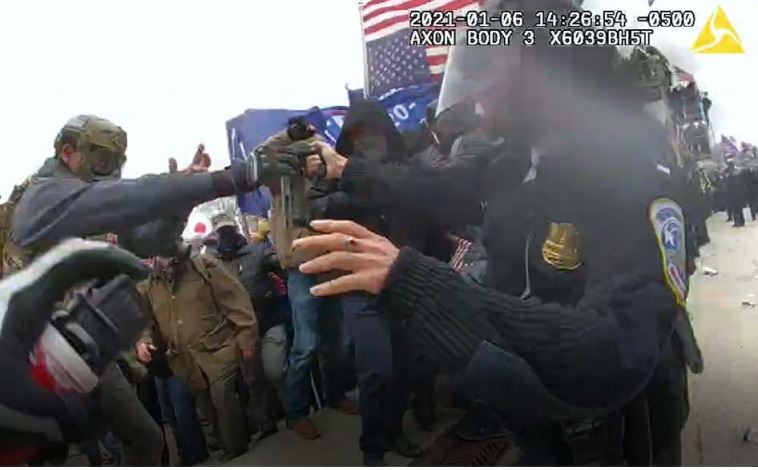A retired Green Beret who prosecutors say worked for the CIA since leaving the Army was denied bond Tuesday by a Washington, D.C., judge after being charged in connection to the Jan. 6 Capitol riot.
Retired Sgt. 1st Class Jeffrey A. McKellop, a former member of 3rd Special Forces Group, was accused of using a flagpole like a spear against a police officer in D.C., as well as assaulting three other officers.
McKellop, who left the service in 2010, worked as recently as 2018 for the CIA and the State Department, prosecutors said in recent court filings. A person familiar with his case previously said McKellop worked as a contractor in Iraq.
At about 2:30 p.m. on Jan. 6, McKellop allegedly donned a helmet and gas mask before moving toward D.C. Metropolitan Police lines as officers attempted to prevent a mob of rioters from breaching the Capitol building, according to a criminal complaint.
Police body cameras caught McKellop pushing officers, trying to grab a riot control spray canister from one and throwing a flagpole like a spear at another, causing a laceration to that officer’s face, the complaint stated.
Greg Hunter and Seth Peritz, two defense attorneys for McKellop, cited his 22 years in uniform and his three Bronze Star medals as they argued in favor of his release from jail until trial.
McKellop, who wore body armor during the Jan. 6 events, only did so to protect himself from counterprotesters, his defense attorneys said in court filings. McKellop also voluntarily surrendered after learning the FBI was seeking him, his defense team added.
Scott Steiert, a fellow Special Forces veteran, said in a letter submitted to the court that he invited McKellop to the rally prior to the Jan. 6 riot because he feared protesters opposing then-President Donald Trump could attack him.

“You must understand Jeff’s personality to know why he brought body armor, gas masks, water, and medical kit,” Steiert’s letter reads. “He is always prepared for the worst-case scenario, that is what his SF training, and roughly 20 years deploying overseas (about 8 of those years protecting State Department and government officials) has taught him.”
Steiert added that he was “almost 100 percent certain” McKellop did not lead anyone, participate in any groups or “plan on doing what he did on Jan. 6.”
But assistant U.S. attorneys Daniel Honold and Mary Dohrmann argued that McKellop’s “deliberate and violent assaults on multiple police officers” protecting the Capitol weighed “heavily in favor of detention.”
The U.S. attorneys wrote in a March 19 filing that McKellop’s military training and ”employment in the intelligence community” should have given him reason to know the acts he allegedly committed were wrong.
“The defendant received extensive military and combat training — including close-quarters combat training — dating back to the 1990′s,” the U.S. attorneys wrote. “He has deployed overseas as recently as 2018 as a contractor working for the Central Intelligence Agency and Department of State.”
Former special operations personnel are often hired to provide security at diplomatic consulates or intelligence stations. What role McKellop played overseas was not immediately clear.
McKellop enlisted in 1987 as an infantryman before becoming a Green Beret radioman roughly a decade later. He deployed to Afghanistan in 2002 and again in 2004. He also deployed to Iraq in 2003 and 2005.
“Such blatant disregard of the law and the authority of a lawful government, despite having held positions of trust and power in the United States government for many years, weighs in favor of detention,” U.S. attorneys wrote.

McKellop could not be reached for comment and Hunter, one of his defense attorneys, did not respond to a request for comment.
Law enforcement officers executed search warrants at two Virginia homes associated with McKellop, one in Fishersville and one in Gainesville.
They recovered a flashbang device in a kitchen at the Fisherville home. Flashbangs emit light and sound in an effort to stun targets. Versions of the device are legal to own but hard to purchase on the civilian market.
Officers also recovered what they described as a “go bag” containing meal bars, water-purification equipment, clothing and a firearm, which is not necessarily odd given McKellop’s background. That bag was in a car registered to McKellop, according to officers.
At both homes, patches and articles of clothing that McKellop allegedly wore during the Jan. 6 riot were recovered.
Pictures included in the complaint against McKellop showed him wearing a patch resembling the country of Georgia’s flag on the front of his body armor. He also had an Army Special Forces patch on his backpack that appears to read, “de oppresso liber,” which means “to liberate the oppressed” in Latin.
“It is concerning that the defendant kept a ‘go bag’ that included a firearm in his car,” the U.S. attorneys’ filing reads. “The defendant clearly came to the Capitol prepared for violent action on January 6, and the evidence recovered in his vehicle indicates that he remained prepared for whatever he may want to do next, including potential flight.”
Kyle Rempfer was an editor and reporter who has covered combat operations, criminal cases, foreign military assistance and training accidents. Before entering journalism, Kyle served in U.S. Air Force Special Tactics and deployed in 2014 to Paktika Province, Afghanistan, and Baghdad, Iraq.




